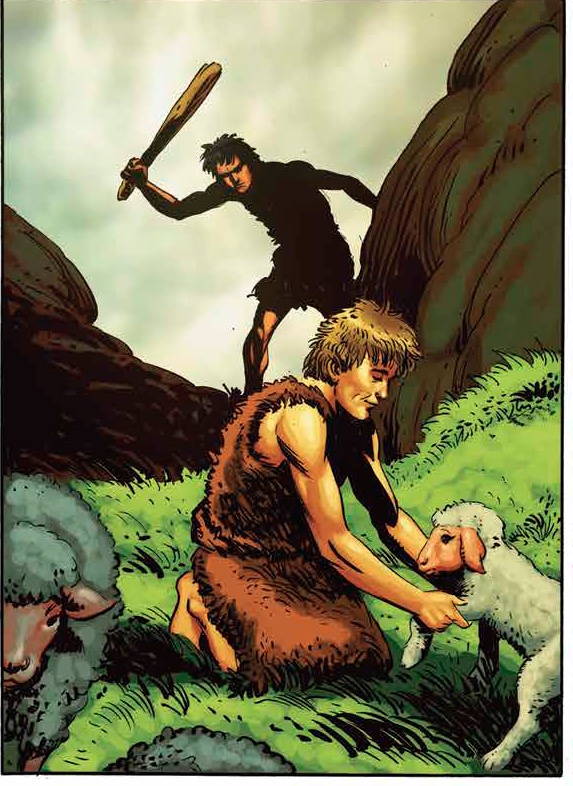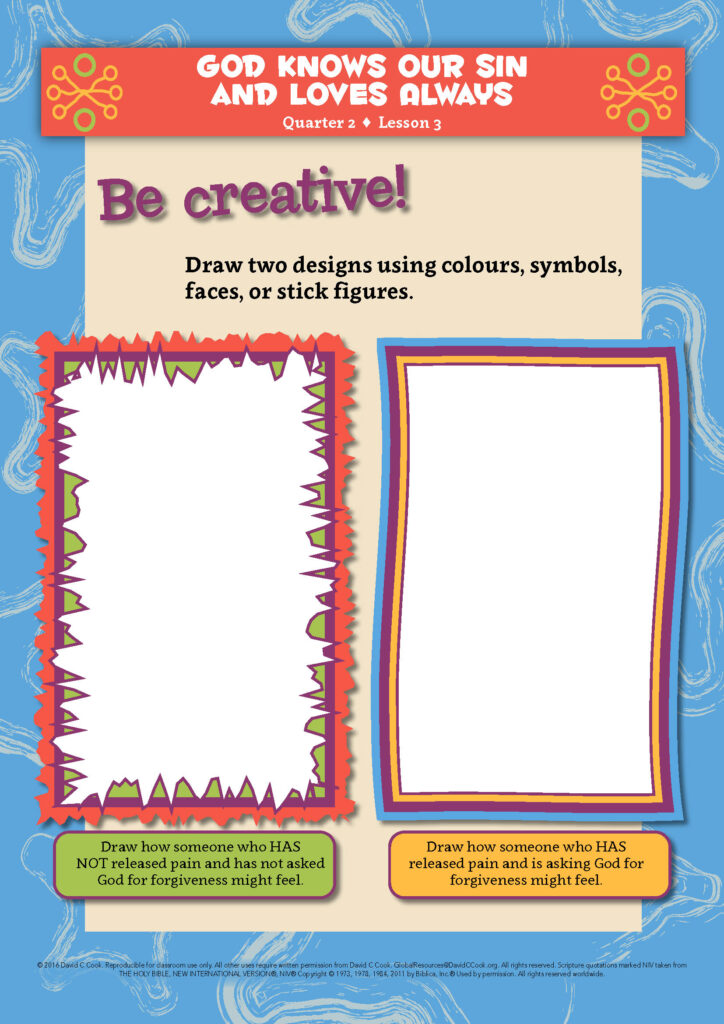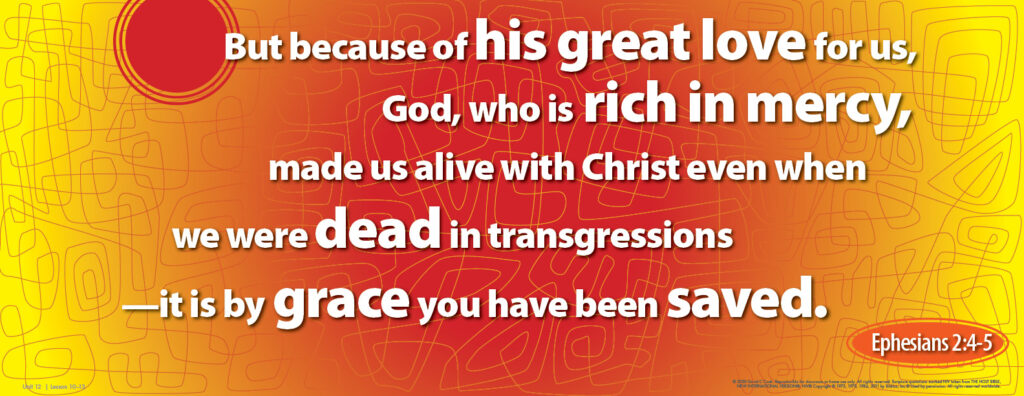During the lesson, the information for you to know is written in regular type, and what we suggest speaking or reading aloud to children is in bold. All resources for this lesson, including the Teacher Guide, Student Page, Family Connection Card, and other resources can be downloaded in a ZIP file by clicking on the following link:
In some lessons you will find "resource articles." These are articles written by experts from around the world to help equip you for your work with children and adolescents. Share them with parents or guardians if you consider it appropriate.
Because of his great love for us, God, who is rich in mercy, made us alive with Christ even when we were dead in transgressions—it is by grace you have been saved.
Ephesians 2:4–5
What hurt and pain are you carrying from being abused, lied to, or cheated? Did you want to respond with anger or punishment for the person who wronged you? Now think of a time when you did wrong to someone else. What was that person’s response to you?
As humans, we often respond with anger, punishment, silence, or other things. Yet God, who is so rich in love, loves us while we are still in our sin and reaches out to restore us to Himself.
Come before Jesus and ask forgiveness of any wrongdoing you may have done. Ask Him to take your burdens and pain. Invite Jesus to fill you with more of the Holy Spirit so that you respond to wrongs as Jesus did—with love.
Let the family members know that in this lesson their children will learn the truth that God loves people even when they do bad things. (Last week they learned that there are consequences for sin.) Encourage them to discuss with their children what the following true statement means to them: Nothing you can do can cause God to love you any less.
Teacher Tip: If possible, email or text the Family Connection Card to the families of your students.
Greet children warmly as they arrive. As you start class, talk with the children about how their week has been and what is happening in their lives so that they see your care for them.
Have the children stand and face you. Explain that you will read situations in which a person hurts or mistreats someone. They will imagine how they would feel and show that feeling through their facial expressions. They should not talk or make noises.
Situation 1: Your friend stole your favorite toy or object. When you asked her about it, she lied to you. Show me how you would feel.
Situation 2: You found out your father cannot afford for you to live with him anymore. He told you that you are leaving tomorrow to live with a relative you have never met. Show me how you would feel.
Situation 3: Your parents got angry because they saw you kicking your younger sister on the way to school. Show me how you would feel.
Situation 4: Every day you walk down the street and call the beggars bad names even though you know it is wrong. Show me how you would feel.
Affirm children for doing a great job showing their emotions through facial expressions, and ask them to quietly sit down.
It is normal to feel hurt, sad, scared, or angry when someone does something bad to you or someone you care about. It is also normal to feel a lot of different emotions when you are caught doing something wrong. Today we are going to learn about how God responds when people do bad things.
I am going to ask you some very hard questions, but I do not want you to answer out loud. Instead, just think of your answer in your mind. After each question, I will be quiet for a short time while you think about your answer. You can close your eyes if it helps you think better. We have talked about some of these questions before.
Ask the children to open their eyes. Say to them:
Being a Christian is not always easy. I know some of you have had some very hard things happen to you. Some of you were badly hurt. This hurt may be on the outside where people can see it, or it may be on the inside where no one can see. If I am describing you, then this Bible story is for you. It is the story of the first murderer. The murderer was one of Adam and Eve’s sons. Do you know who he killed? His brother! This is the story of how God responded to the murderer after he killed his brother.
Read the story with expression. Use your face and physical gestures to show emotion and to illustrate action throughout the story.
Cain was angry about what had happened that day. He may have been thinking something like, “It is not fair! God should have accepted my offering.”
Cain and his brother, Abel, both knew they should bring their best gifts as an offering to God. An offering meant they wanted to give something important to God. Cain was a farmer. He gathered some crops from his field and went to give his offering. Abel was a shepherd. For his offering, he had carefully chosen the best sheep in his whole flock and prepared his offering from the best pieces of meat.
Then Cain and Abel both gave their offerings to God. God did not accept Cain’s offering, but He did accept Abel’s offering. Cain felt angry and very annoyed. The Bible does not tell us what he was thinking, but he may have felt that it seemed like Abel always did everything right.
God knew what Cain was thinking. God said, “Cain, why are you so angry? Why do you look so sad? If you do what is right, I will accept your offering. But if you do not do what is right, sin is crouching at your door to control you.”
If possible, show The Action Bible picture of Cain and Abel.

But Cain did not admit that he was wrong. He did not ask God to forgive him. Instead, he asked Abel to come to a field, and then Cain killed Abel. Suddenly, Cain heard a voice. It was God’s voice!
“Where is Abel?” God asked Cain.
“How should I know?” Cain said. “It is not my job to watch out for him!”
“Look what you have done!” God said. “Your brother’s blood is calling to Me from the ground.”
God had seen everything. But Cain still would not admit that he had done anything wrong. God had to discipline Cain for what he had done. Listen to the awful punishment God gave Cain.
Read God’s discipline as it is written in the Bible.
When you work the ground, it will no longer yield its crops for you. You will be a restless wanderer on the earth.
Genesis 4:12
Cain cried out when he heard his punishment. “I cannot bear it. You are driving me from the land, and I will be hidden from Your presence. I will be a wanderer with no home, and whoever finds me will kill me. This punishment is too awful.”
God punished Cain severely because he had done a terrible thing. He was the world’s first murderer. But God still cared about Cain. Despite what he had done, God still loved him. So God put a mark on him to protect him. Cain had sinned, and there were consequences. Even though God still loved him and protected him, Cain lived apart from God.
Optional: If you are using The Action Bible, let the children read the story on pages 24–28. Encourage them to share anything new they learned.
Talk about these questions. Allow 1–2 children to answer if someone has a different perspective.
God knows and sees everything; no one had to tell Him.
God gave Cain chances to admit his sin and ask God to forgive him. God put a mark on Cain to keep him from being hurt by others. Even though Cain had sinned, God loved him and continued to take care of him. Remember, though, God also punished him for his sin.
God loves us. He knows everything we do. God’s love is unchanging even when we sin.
God warned Cain about his temptation, but Cain still chose to kill his brother. And even after that, Cain could have asked for God’s forgiveness when God confronted him. It would have changed his life completely.
We do not know what God would have done if Cain had asked God for forgiveness. But the Bible tells us that when we confess our sins to God with a sincere heart, He “is faithful and just forgive our sins” (1 John 1:9). He draws us near and helps us become His good friends again.
Remember that earlier during class you thought about things you have done wrong that hurt others. Some of the hurts are small and some feel as big as the world. God knows everything.
He is very sad and even angry when someone is hurt by someone else. He will punish that person in His own time and in His own way. Consider Cain. God punished him, but God also showed His love to Cain by not allowing anyone to kill him. God wants everyone to admit his sin, ask for forgiveness, and begin to live the right way. God has given people the right to choose. They can repent and follow Him, or they can continue to sin against Him.
Perhaps when you have done something wrong, the other person’s response was angry and hurtful. Perhaps that person quit speaking to you. Perhaps that person was angry and verbally or physically abused you. Perhaps you were punished so severely you felt like Cain, thinking it was too much to bear. Those are all very human responses.
Optional: If you are using Student Pages, allow the children to do the creative activity about forgiveness.

What you need to know is that God does not respond the way a human does. When we or someone else does wrong, it breaks God’s heart. God does not want you to have to carry the burden of what you did wrong. When you ask His forgiveness, He will forgive you, and you can begin to experience His peace. God also does not want you to carry the burden of feeling guilt or shame about what you did. When you receive His forgiveness, you can also ask Him to heal your heart of all the hurt surrounding what you did wrong.
Explain that children will have the opportunity to express their wrongdoing, guilt, shame, and hurt in a physical way and then release it all to God. If they are not ready to ask for forgiveness or to fully let go of their negative feelings, which is okay. They can still participate in this response time. Assure them that God loves them and hears their prayers, even if they are not yet ready to ask for forgiveness. Assure them that God is waiting to forgive them if they repent of their wrongdoing and ask Him to forgive them.
Think again about the wrong you have done. Think about how negative this made you feel. If you still feel shame, guilt, or hurt, clench your fists tightly. You may feel tightness or tension going through your body. Let your body feel all your negative emotions.
Pause for students to think and feel these things.
Jesus does not want you to carry all that pain and hurt. He wants to carry it for you. The Bible tells us to cast our cares and anxieties on God because He cares for us (1 Peter 5:7). Listen to this verse that tells us about God’s love for us even when we have done wrong.
Because of his great love for us, God, who is rich in mercy, made us alive with Christ even when we were dead in transgressions— it is by grace you have been saved.
Ephesians 2:4–5

If you are ready to ask God’s forgiveness for what you did, release the tension in your hands. Hold them out, palms up. Imagine you are letting go of your wrongdoing, shame, guilt, and pain.
Take a deep breath and quietly pray these words: “Jesus, please forgive me for the wrong I have done. Help me receive your forgiveness. Take my shame, guilt, and hurt and begin to heal my heart.”
Give children time to pray quietly.
Allow the tension to leave your body. Let your arms and the rest of your body relax. You can sit up straight or even stand up.
Allow time for the Holy Spirit to minister. After a few minutes, speak this blessing over them:
Blessing: May God, who loves you richly even when you do bad things, pull you into His warm embrace. May you receive healing from shame and guilt. May you know His great love for you.
Lead the children in singing “Blessed Be Your Name” again, if possible.
Life on Life ©2020 David C Cook. Reproducible for home or classroom use only. All other uses require written permission from David C Cook [email protected]. All rights reserved.